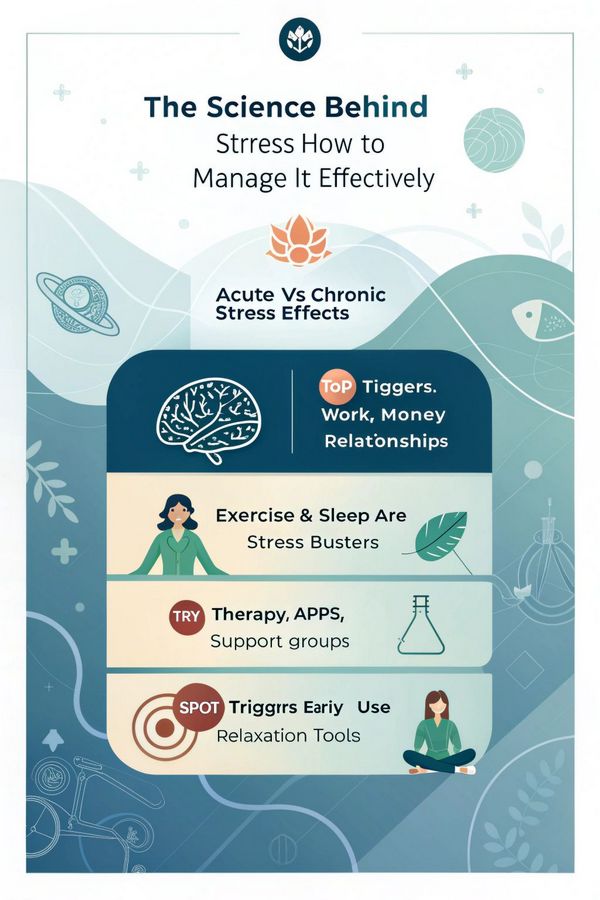Stress is something we all face. Work deadlines, money troubles, or even family issues can make us feel overwhelmed. It’s a feeling that can take over your body and mind if not handled well.
Did you know stress isn’t always bad? Short-term stress can boost focus and help solve problems. But long-term stress harms your health—causing anxiety, depression, or even heart problems.
This blog will show easy ways to manage stress for a healthier life. Keep reading—you’ll thank yourself later!
Understanding Stress
Stress is how your body reacts to pressure or challenges. It can affect both your mind and body in surprising ways.
What is Stress?
Stress is the body’s reaction to pressure or danger. It triggers a “fight or flight” response that releases hormones like cortisol and adrenaline.
This response can help in short bursts, such as during emergencies. But ongoing stress, called chronic stress, harms health. It may lead to high blood pressure, heart problems, anxiety, and depression.
Key Stress Responses
The body reacts to stress in clear ways. Heart rate and breathing speed up. Muscles tighten, ready to act. The brain releases hormones like cortisol and adrenaline to handle the challenge.
These reactions can help short-term situations. But constant responses harm health over time. Chronic stress links to high blood pressure, anxiety, and depression. It also increases risks of clogged arteries and bad habits like overeating or smoking.
Types of Stress
Stress comes in different forms and affects people in unique ways. It can be short-term or long-lasting, each presenting its own challenges.
Acute Stress
Acute stress hits fast but doesn’t last long. It can happen after a sudden event, like an argument or missing a deadline. Your body reacts quickly—heart races, muscles tense, and breathing speeds up.
This response helps you handle danger or challenges.
Short bursts of acute stress aren’t always harmful. They prepare the body to act by releasing hormones like adrenaline. But too much can leave you feeling drained or upset later.
Simple relaxation techniques like deep breathing or short walks often help reduce its impact on your health and emotional wellbeing.
Chronic Stress
Chronic stress lasts for weeks or even years. It can come from ongoing problems like work pressures, financial struggles, or unhealthy relationships. Over time, it harms your body and mind.
High blood pressure, clogged arteries, anxiety, depression, and addiction are all linked to chronic stress.
This type of stress wears down the brain and affects resilience. It makes coping harder over time. Eating healthy meals—like more fruits and vegetables—getting enough sleep (at least 7 hours), exercising regularly, and practicing mindfulness help reduce its impact.
Causes of Stress
Stress can come from many areas of life. Sometimes, it hits hardest when we least expect it.
Work-related pressures
Deadlines, meetings, and long hours create work-related stress. A survey in 2023 showed over 60% of workers felt overwhelmed at their jobs. Constant pressure can lead to anxiety and high blood pressure.
People often skip meals or lose sleep because of job demands.
Managing this stress is key for mental health. Setting priorities and taking short breaks helps a lot. Regular exercise boosts mood and fights tension. Simple relaxation techniques like deep breathing during busy days can make a big difference too!
Financial difficulties
Money problems can cause serious stress. Paying bills, managing debt, and handling unexpected costs may feel overwhelming. Financial pressure often leads to sleepless nights or anxiety about the future.
Chronic money stress impacts both mental and physical health. It is linked to high blood pressure, depression, and even unhealthy coping habits like overeating or smoking. Making a budget or seeking advice from a counselor helps reduce this burden.
Relationship issues
Fights with loved ones cause stress. Constant arguments or lack of trust lead to mental and emotional strain. This can trigger anxiety, depression, or even poor sleep habits. Stress from such issues may also affect blood pressure and heart health.
Healthy ways to cope include open talks, counseling, or mindfulness exercises. Practicing gratitude helps improve relationships and emotional well-being. Brain health improves when you manage these stresses early.
Physical and Mental Effects of Stress

Stress can affect your body and mind in surprising ways. It may lead to serious health problems or disrupt your emotional balance.
Health complications
Chronic stress harms the body and mind. It can cause high blood pressure, blocked arteries, and heart problems. Stress also weakens the immune system, making you sick more often.
It links to mental health issues like anxiety and depression. Long-term stress increases risks of substance abuse or other harmful habits. Taking steps to manage it helps protect overall well-being.
Impact on mental health
Stress harms mental health. It raises the risk of anxiety and depression. Many people under stress also struggle with focus and memory issues. Long-term stress can lead to addictive behaviors like overeating or smoking.
High levels of stress affect brain health too. Studies link it to changes in brain structure that impact mood and decision-making. Stress management techniques, such as mindfulness or exercise, support emotional well-being and resilience.
Recognizing Symptoms of Stress
Stress can show up in ways you might not expect. These signs often affect both your mind and body, making daily life harder to handle.
Emotional signs
Feeling overwhelmed or irritable can be a clear sign of stress. It may also cause anxiety, sadness, or mood swings. Many people feel restless and unable to relax during stressful times.
Some withdraw from friends and family without realizing it.
These emotional changes often come with negative thoughts. Stress might make someone doubt their abilities or fear failure at work or school. Chronic stress is linked to depression and addictive behaviors like overeating or drinking too much alcohol.
Physical signs
Stress shows up in the body in many ways. You may notice headaches, tense muscles, or a racing heart. Chronic stress can also raise blood pressure and cause chest pain. Clenched jaws or grinding teeth are common too.
Digestive issues like stomachaches or nausea might occur as well. Some people sweat more or get shaky hands during stressful moments. Fatigue often kicks in even with enough sleep.
Long-term stress can weaken the immune system, making it easier to get sick.
Effective Stress Management Techniques

Managing stress can feel tough, but simple steps can make a big difference. Small changes in daily habits can lead to better balance and calmness.
Exercise and physical activity
Physical activity lowers stress hormones like cortisol. It releases endorphins, which improve mood and reduce anxiety. Aerobic exercises such as walking, jogging, or biking are especially helpful for stress relief.
Aim for at least 30 minutes of exercise most days to feel the benefits.
Even simple movements can help. Stretching or yoga calms the body and mind. Activities like dancing or team sports combine fun with physical effort. Regular exercise also improves sleep quality and boosts resilience to stress triggers over time.
Mindfulness and meditation
Mindfulness helps focus your thoughts on the present. It reduces stress and improves emotional wellbeing. Meditation works alongside mindfulness to calm the mind and body. Studies show it lowers anxiety, promotes relaxation, and boosts brain health.
Practicing daily can build resilience against stress triggers like work or financial pressures. A few minutes of quiet breathing each day creates mental balance. This is one of the most effective stress reduction techniques for long-term wellness.
Proper nutrition
Good nutrition keeps stress in check. Eating a plant-based diet filled with fruits, vegetables, and whole grains helps the body fight inflammation caused by stress. Avoid sugary foods or heavy meals that can make fatigue worse.
Balanced meals give energy and improve mood. Foods like nuts, seeds, and leafy greens support brain health. Stay hydrated to prevent headaches linked to tension. A healthy diet boosts resilience against both physical and mental stress triggers.
Adequate sleep
Getting at least seven hours of sleep daily helps reduce stress. Sleep allows your body and brain to recover. Poor sleep can worsen anxiety, depression, and even lead to high blood pressure or other health issues.
Creating a bedtime routine improves rest. Avoid caffeine late in the day. Keep your bedroom quiet and dark. Meditation before bed also helps calm the mind for better relaxation and emotional wellbeing.
Advanced Stress Management Strategies
Some stress needs extra help to manage. Advanced methods can offer deeper ways to handle tough situations.
Cognitive Behavioral Therapy (CBT)
Cognitive Behavioral Therapy (CBT) helps people manage stress by changing negative thought patterns. It focuses on how thoughts, feelings, and actions connect. For example, a person feeling overwhelmed at work might practice breaking down tasks into smaller steps.
This can reduce anxiety and improve focus.
CBT provides practical skills to handle stressful situations more effectively. It often includes writing exercises or role-playing to try out new behaviors. Studies associate CBT with reduced levels of anxiety and depression caused by chronic stress.
Professional therapy sessions typically guide this process, but many online programs also provide support with CBT techniques today.
Stress management programs
Stress management programs teach ways to handle pressure better. They often include exercises, mindfulness practices, and counseling. Programs may also guide people in setting priorities to reduce overwhelm.
These strategies improve physical health by easing issues like high blood pressure and anxiety.
Such programs focus on practical tools like progressive muscle relaxation or warm baths for stress relief. Some even offer group support sessions or online resources for extra help.
This approach promotes resilience and emotional well-being while boosting overall mental health.
Professional counseling
Professional counseling helps manage anxiety and emotional well-being. It provides tools to cope with stress triggers like work or relationships. A counselor offers support while helping you develop healthy coping techniques.
Chronic stress can harm brain health and increase health risks. Counseling addresses these issues through strategies like Cognitive Behavioral Therapy (CBT). This builds resilience, reduces anxiety, and promotes mental balance.
Tools and Resources for Stress Management
You can use simple tools to handle stress better. Things like apps, support groups, or guides can help make life easier.
Apps and online resources
Stress management apps offer guided meditation and relaxation techniques. Calm and Headspace provide breathing exercises, sleep stories, and quick stress relief tips. These tools help build mindfulness practices.
Online programs like CBT-based modules teach coping strategies. They address anxiety management through interactive lessons. Many resources focus on improving emotional well-being with easy-to-follow steps.
Support groups
Support groups bring people together to talk about shared problems. These groups help reduce stress and provide emotional support. They can focus on work pressures, relationship challenges, or anxiety management.
Members share tips like mindfulness practices, exercise routines, or relaxation techniques such as warm baths.
Joining a group builds resilience by showing you are not alone in facing stress triggers. Discussing mental health openly promotes emotional well-being. Many groups meet online through apps or resources designed for convenience.
Professional counseling may also combine with group sessions to improve coping skills further.
Educational materials
Educational materials can help with stress relief. Apps and websites teach mindfulness, relaxation techniques, and stress triggers. They guide users on healthy sleep habits, proper nutrition, and exercise routines to reduce anxiety.
Books and online courses explain the science behind stress. They cover topics like Cognitive Behavioral Therapy (CBT) and resilience-building strategies. These tools support emotional well-being by offering practical stress management tips.
Preventing Stress
Preventing Stress: Spot your stress triggers early and build habits that keep you calm every day—there’s more to explore ahead!
Identifying triggers
Stress often starts with triggers. These are events or situations causing worry, pressure, or fear. Common stress triggers include work deadlines, money problems, and tough relationships.
For example, missing a bill payment can lead to panic about finances.
Knowing your triggers helps you take control. If work stress overwhelms you, set clear priorities to ease the load. Stress reduction techniques like exercise or mindfulness can help calm your mind when specific triggers appear.
Developing healthy coping mechanisms
Set priorities to keep life balanced. Focus on what you can control and let go of the rest. Stay active with regular exercise like walking or yoga. Eating meals rich in fruits, vegetables, and whole grains supports your mental health too.
Use relaxation techniques like deep breathing or warm baths to unwind. Try progressive muscle relaxation for tight muscles caused by stress. Practicing mindfulness daily helps you stay calm and focused under pressure.
Conclusion
Stress touches everyone, but managing it can make life better. Simple steps like exercising, eating well, and getting enough sleep help a lot. Don’t ignore stress—take charge of your health today! Small changes now can lead to big peace later.
Stay kind to yourself—you deserve it.
Frequently Asked Questions (FAQs)
1. What causes stress in our daily lives?
Stress comes from many things—work, family issues, money problems, or even health concerns. It happens when your brain feels overwhelmed by challenges or changes.
2. How does stress affect the body and mind?
Stress can make your heart beat faster, cause headaches, and even upset your stomach. Mentally, it might leave you feeling anxious, tired, or unable to focus.
3. What are some simple ways to manage stress effectively?
Take deep breaths, exercise regularly (even a short walk helps), and try relaxing activities like reading or listening to music. Talking to someone you trust also works wonders.
4. Can learning about the science of stress really help me handle it better?
Absolutely! Understanding how stress works gives you tools to fight it—like knowing when to rest or finding what triggers your stress so you can avoid it next time.

